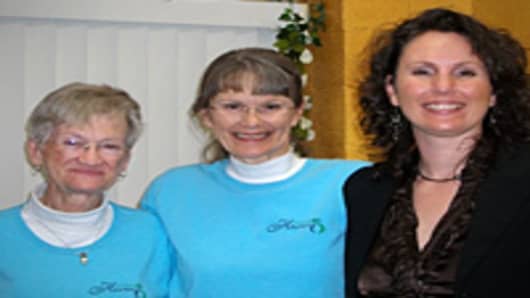Sierra Neblina knows about pain. She's had more than enough of her own.
Since February 1, Neblina—along with her mother and grandmother—have operated the Medimar Haven dispensary and healing center in Lakewood, a large suburb west of Denver.
After growing up in nearby suburb, she joined the Army during the first Gulf War. Stationed stateside, Neblina learned to drive the launch trucks that carried Patriot missiles. She also trained as a sniper and served in the military police.
“No one wanted to tangle with a female MP,” she says. “They are the meanest of the bunch.”
Several years after her discharge, Neblina began suffering from migraines.
“I went to neurologist after neurologist, they gave me drug after drug,” she says. “I tried everything they threw at me, and it all made me sick.”
In 2007, doctors discovered she had bleeding ulcers and her gall bladder was removed, she says, blaming both maladies on the amounts of Advil she’d been taking for migraines.
“I lost 30 pounds. I started thinking I’d never be well. I decided I was going to try something else," she says.
She called a ski buddy who was a medical marijuana grower, who arranged for a doctor to get her a user's license in August 2007.
“I didn’t want to be a stupid stoner,” she says, “but I took one hit, stood up and said ‘Oh my god, is this all it took?’”
Things got better until October, when she suffered a massive stroke. Doctors found she had a hole in her heart that had been misdiagnosed at birth, she says.
During her recovery over the ensuing years, Neblina—who was too weak to hold a regular job—began making plans for her own dispensary.
“In 2009, I was looking for investors, but the ones I talked to were only in it to make money,” Neblina said. "I wasn’t. I wanted to open up a healing center. I wanted to provide low-cost, high-grade medical marijuana for patients, so they feel empowered in their own well being.”
For investing capital, she went to the people “who were most on the same page with me." They figured it would cost $18,000 to get the doors open, more to stock the shelves.
Neblina’s grandmother, Connie Ziemacki; a friend, Esther Shapiro, a registered nurse; and her mother, Linda Farnsworth, a certified nursing assistant and dialysis technician all contributed the necessary money and labor. All the owners are also card-carrying patients.
Finding a location for Medimar was tough. Neblina made her wishes known to Lakewood city officials, working with them as they formulated rules for regulating dispensaries. The commercial property owners were a conservative lot, Neblina found. Just because they had plenty of empty space didn’t mean they wanted a dispensary as a tenant.
"They said pot shops would bring damage to their property, they’d lose other tenants," Neblina remembers. Finally, she found an absentee landlord from California, who is "well-educated about medical marijuana and isn’t afraid of dispensaries.'"
Using Neblina’s experience as a contractor, the space was transformed to closely resemble an everyday medical office.
“It feels like you wish you felt when you went to your doctor,” says Jessica Corry, a Denver attorney and medical marijuana advocate. “They nailed that.”
Behind the receptionist area is the “main budtending room,” as Neblina calls it, where she meets with patients. The front of her desk is lined with 10 strains of marijuana samples in jars. There’s also a $15,000 state-of-the-art security system,
“I vet my patients carefully,” she says. “I have them bring in their health histories. I have them fill out an assessment form that asks about their debilitating conditions. I try to figure out which strain would help them most. I have them take a little home, test it and write down their reactions. I give my patients homework.”
Neblina also arranges for doctors to visit and meet potential clients.
With only two months in business, Medimar is not yet profitable. Twenty patients list it as their primary caregiver and another 100 patients buy there. It’s tough to keep the shelves supplied with pot and the refrigerator stocked with edibles such as chocolate-covered cherries laced with marijuana.
Neblina pays 7.8 percent sales tax to Lakewood and another 3.8 percent to the state.
“I want to make a good living for myself and three or four other people,” she says. “It’s amazing it’s going this way, that people are finding they can have alternative medicine. The business end is very important to me, I want to be taken seriously as a business, but primarily I’m here to impact the patients' well being.”


